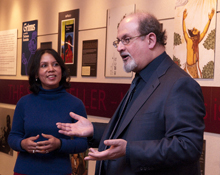People
March 15, 2010
Rushdie 'most interested' in treatment of digital material

Deepika Bahri and Salman Rushdie
Distinguished Writer in Residence Salman Rushdie and Director of Asian Studies Deepika Bahri, curator of “A World Mapped by Stories: The Salman Rushdie Archive,” answer questions from reporters about the opening of the novelist’s archives at Emory.
Is this exhibit what you were envisioning when you decided to put your papers here at Emory?
Salman Rushdie: It’s much better than what I was envisioning…I’m very flattered to have this scale of exhibit and by the enormous care that’s been taken, both with the papers in general and Deepika’s amazing work here with the show.
If you could talk a little bit more about the negotiation of what you were willing to share?
Rushdie: The biggest issue for me in the whole discussions with Emory had to do with privacy and what would be the boundaries of that privacy. One of the things I was very concerned about is that it’s not only my privacy that’s at stake, but that of many other people. Obviously my family, but also friends and colleagues who would have written to me in the belief that they were writing a private communication.
I must say, actually, folks here have been very sensitive in responding. … In general, my view was that if it’s about my work, I don’t mind. Anything that’s to do with how I got to write the books that I’ve written, whatever steps there were along the way, I’ve got no problem with people studying that. That’s what you want a university to be for.
The question is, where is that boundary? …It was a very long and careful conversation that we had.
Deepika Bahri: I did want to add that some of the material is on view for the exhibit only. We had to go one by one and make sure that it met with Salman’s criteria. It’s a very generous archive in every sense of the word. It shares not only the author’s views on the world, in fiction and in nonfiction, but a lot of those things that make us human, and that’s where things can get messy (laughter) …. There’s lots there to dig into.
How comfortable do you feel with a digital archive as a writer who grew up with books and who loves books?
Rushdie: I was relatively late in using computers. The first book I wrote on a computer was “The Moor’s Last Sigh.” People would say, computers make you lazier as a writer, you write too much, it’s sloppier, and so on. I rather rapidly discovered that my experience was the opposite... [and] became a convert.
I think this is maybe the first one of what will then be a great stream of such archives, because clearly from now on there’s going to be an enormous amount of digital material. I have these old broken-down computers that people had to fish information out of, and then the privacy issue becomes even more extreme. How do you provide a way of looking at this material? There’s been an amazing piece of techno-wizardry behind just making this available. It’s been fascinating to see that happen.
In many ways, of everything to do with the archive, I’m most interested in that: the way in which the digital material is being treated.
A lot of the information about your time in hiding in the fatwa is being kept private. Do you have any plans to use that for an autobiography or a book about that time in your life?
Rushdie: Yes, but don’t ask me when. It’s my story and at some point it does need to get told.
My instinct is that the point’s getting closer, and one of the reasons for that is the work that’s been done here. I think when this stuff was just in cardboard boxes and dead computers it would have been very hard to go back and revisit it, but now that it’s all organized, it makes it much easier to contemplate.
How has your time been here teaching and lecturing?
Rushdie: It’s the first time I’ve ever done this kind of organized teaching. I’ve quite often been to colleges to lecture or take part in a seminar, but to be here for a period of weeks and to be with the same students during that time has been enormous pleasurable for the simple reason that the students have been very smart. It’s actually very easy. You sit in a room with intelligent young people talking about books that you all like, and what’s wrong with that?
